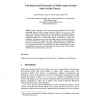Free Online Productivity Tools
i2Speak
i2Symbol
i2OCR
iTex2Img
iWeb2Print
iWeb2Shot
i2Type
iPdf2Split
iPdf2Merge
i2Bopomofo
i2Arabic
i2Style
i2Image
i2PDF
iLatex2Rtf
Sci2ools
122
Voted
IBERAMIA
2004
Springer
2004
Springer
Checking Social Properties of Multi-agent Systems with Activity Theory
Many approaches of the agent paradigm emphasize the social and intentional features of their systems, what are called social properties. The study of these aspects demands their own new techniques. Traditional Software Engineering approaches cannot manage with all the information about these components, which are as related with software development as with social disciplines. Following previous work, this paper presents a framework based in the Activity Theory to specify and verify social properties in a development process for multi-agent systems. Using this framework developers acquire tools for requirements elicitation and traceability, to detect inconsistencies in their specifications, and to get new insights into their systems. The way of working with these tools is shown with a case study. Keywords Multi-Agent Systems Development, Activity Theory, Validation and Verification
Activity Theory | Artificial Intelligence | IBERAMIA 2004 | Multi-agent Systems | Social Properties |
Related Content
| Added | 01 Jul 2010 |
| Updated | 01 Jul 2010 |
| Type | Conference |
| Year | 2004 |
| Where | IBERAMIA |
| Authors | Rubén Fuentes, Jorge J. Gómez-Sanz, Juan Pavón |
Comments (0)

